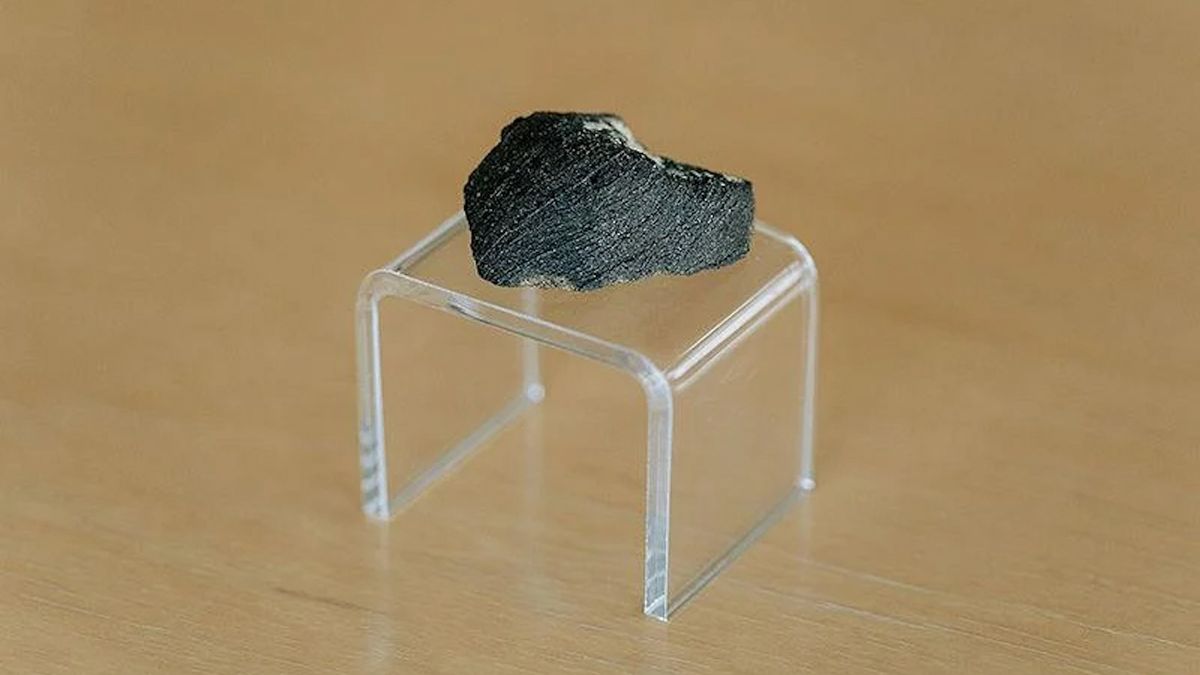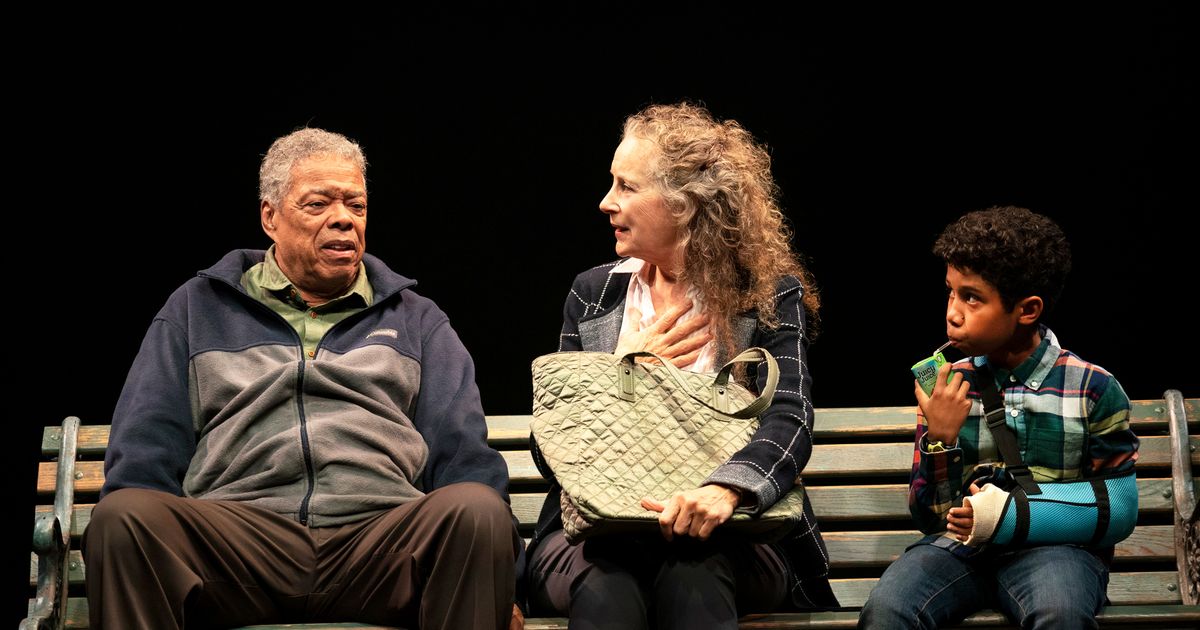From The Underlying Chris, at Second Stage.
Photo: Joan Marcus
Many theater-lovers will tell you that theater is a church. We gather. We worship. We hope there will be cookies after the service. And of all our thousand playwrights, Will Eno seems most like an actual country pastor — he has that twinkling gravity and “my other outfit is a cassock” vibe. More important, his plays have the quality of a sermon, in that they seem like time set aside to do serious thinking about existence. They have weight to them. Even in his strangest and most absurd works, there’s typically a message about the duty of care.
The last production Eno had in New York was the wry and metaphysical revival of his Beckettian Thom Pain (based on nothing). Before that, it was the wry and metaphysical production of his Sartre-in-suburbia meditation Wakey, Wakey. It will not surprise you, then, that The Underlying Chris at Second Stage is wry and metaphysical. Here, though, Eno has backed well away from those previous plays’ normcore otherworldliness and made something deliberately mild: He’s looking long and lightly at a life, rather as Thornton Wilder would.
We first meet Chris as a tiny baby, not quite three months. His mother (Hannah Cabell) looks lovingly over the edge of his bassinet and worries about the “click” his back has started making, ever since his dad flew him around the room. His father (Howard Overshown) reassures her: “Things just don’t start out of nowhere.” Well, they do. Abruptly, a new set slides into view, and Chris is now 10 years old (Nicholas Hutchinson). The boy talks matter-of-factly about his love of diving (it feels like flying) and the fact that he doesn’t remember his father’s death, since it happened when he was a baby.
Another new room glides onstage, and we’re in a hospital, but now Chris — still with a tricky back, still with a love of diving — is Christine, a girl of roughly 13 (Isabella Russo). Chris hasn’t transitioned; we are at the next part of Chris’s story, and certain … details have simply changed. Cabell now plays Chris’s aunt and Overshown is a doctor, tired but charmed by Chris’s pert humor. He asks if she knows what the philtrum, that groove between our nose and lips, does. Nothing, it turns out — it’s just where the two halves of our face grew together in the womb. Why has he told her this? “I don’t know, you’re a smart kid,” he says. “Insert a helpful metaphor. ‘It all comes together in the end.’”
Chris proceeds through existence in these little hops. In deft, small scenes that are usually about the chance beginning or end of a relationship, nearly the entire company plays Chris at some stage. Gender doesn’t define Chris, nor does race. Chronology does, though, so each iteration gets older and older. We see Chris as a mother (Nidra Sous la Terre) setting up a therapy practice, and then later on, as a grandfather (Charles Turner) hoping for a treat on a walk. Yet the biography stays steady. Losses sustained are losses forever; betrayals must be mended; a painful back is always there, and it’s only ever going to get worse. Everything causes ripples of effect: The early bereavements cut Chris loose, so there are many paths tried and abandoned, from medical school to psychiatry to acting. Clearly Chris and the play both are interested in a progress of investigation, from the body through the mind and finally into the pretended self. The play never so much as winks at the supernatural, yet there’s still a sensation of … lifting up and off.
The new-Chris-every-scene setup is quickly absorbed, but The Underlying Chris is still immensely delicate. A few things in Kenny Leon’s production treat it roughly: The choreography of Arnulfo Maldonado’s sets sliding back and forth was still a little herky-jerky when I saw it, so performers occasionally seemed nervy as the show rattled around them. Once inside a scene, though, Leon’s company works handsomely, able to create convincing portraits in only a few strokes. Everyone does a lovely job, but Overshown’s weary and slightly punchy approach is particularly effective, as is Sous la Terre’s laughing warmth.
In a time gone by, drama that dealt with a person’s life from cradle to grave would have been a morality play, with choices guiding the soul closer or farther from God. The Underlying Chris is an anxious parent’s play, not a religious one, concerned as it is with the way our Everyperson Chris is buffeted and changed by every accident and careless gesture. Why, oh why, did that father ever fly that little baby around the room? But there’s still a certain spiritual organization to the play, the faintest echo of the pulpit. When death inevitably comes (spoiler! It comes for us all), we see the funeral. Characters, played by all the many physical bodies we have known as Chris, stand around in mourning. We, though, remember that Chris is in all of them. Eno, in a clever exchange, has used the specific way that theater asks us to suspend belief to create belief. Something is everlasting, after all.
Here endeth the lesson.
Where The Underlying Chris is quiet, the Bedlam production of The Crucible has chosen to be loud. Arthur Miller’s 1953 man-against-the-mob drama is already full of hectoring: Puritan gents hassle the girls into explaining why they were dancing in the moonlight; John Proctor (Ryan Quinn) bugs his wife Elizabeth (Susannah Millonzi) for not forgiving his adultery fast enough; creepy little Abigail Williams (Truett Felt) basically nags all of Salem into believing she’s a witch-detector — and that’s all before the courtroom scenes begin. But in Eric Tucker’s production, this noisy quality has been amplified and exaggerated further, cranked up to an action-movie decibel level.
There are strong forces at work in this Crucible. The first is Miller’s play, a rather self-serving and long-winded text, particularly in the way it bangs the gong about John Proctor’s goodness. My skin always crawls when Elizabeth takes John’s unfaithfulness into her own burden of guilt. He cheated on you with a 17-year-old, Elizabeth! It’s okay to let him wear that. But as a play, boy oh boy, it’s like a slab of muscle. Tucker tries to affect its sense of gravid realism with nonrealistic staging choices, like a tableau in which an actor holds a slate that reads “The Crucible” over his head, or painfully bright lights, shining in our eyes, that make us all feel as though we’re being cross-examined. As the situation deteriorates, Tucker has people crawl across the floor like animals, or just shout. But the play itself yanks back. Scenes work best when they’re delivered without embroidery; otherwise, they falter. I love a bit of directorial manhandling, but here the play just fights it all to a draw.
The other major force is Susannah Millonzi. There are several wonderful actors in the production — the great Paul Lazar weasels around as a judge with a keen sense of his own consequence; Tucker himself does a super, morally slippery Reverend Hale. All the women do extremely fine work, particularly Truett Felt — an Abigail who thinks she’s Saint Joan — and Shirine Babb, who beautifully conveys the terror of Tituba and the placid certainty of Rebecca Nurse. But Millonzi is something else altogether. She’s giving one of those performances of total transparency that come along very rarely. Thoughts and pain and memories move like storms across her stunned face, always leaving wreckage for the next storm to find. Her Elizabeth takes the play right away from John; I would say she even takes it away from Miller, who wanted to reserve the great part for the guy. If the text is a muscle, Millonzi is its bones. For John and for Miller, the “crucible” is the pressure of decision, the moment the honorable man proves his honor through sacrifice. For the first time, I’ve seen an Elizabeth who seems to have been in her own different sort of crucible even before the show starts. Certainly she seems to have been burned clean — purer and finer than almost everything around her.
The Underlying Chris is at Second Stage through December 15.
The Crucible is at the Connelly Theater through December 29.













